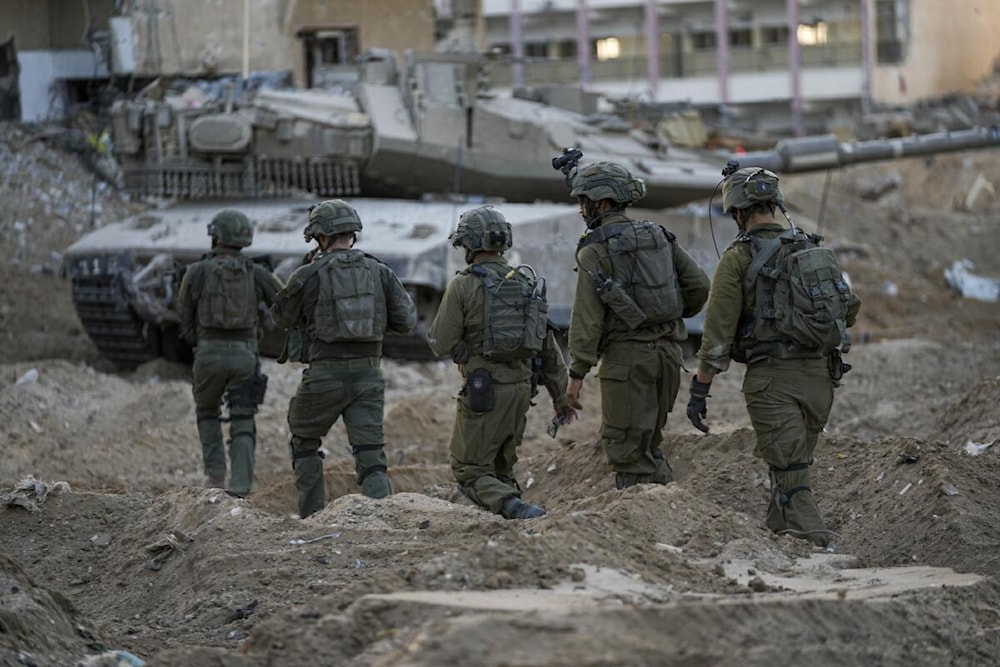Renewed Israeli war on Gaza increasing military leadership frustration
The New York Times reports that Netanyahu's refusal to engage in discussions about the day following the war has facilitated Hamas's ability to rebuild itself in the Strip after seven months of war.
-

Israeli occupation soldiers during the invasion of the Gaza Strip, on Wednesday, November 8, 2023 (AP)
Failure to reach plans for the "day after" the war on Gaza has forced the Israeli occupation forces to re-invade areas in northern Gaza, which it earlier claimed that it had taken control of. Over seven months into the war, the new offensive, which included Rafah, has placed occupation forces at heightened risks, The New York Times said in a report on Tuesday.
Israeli military officials are growing frustrated with the government, the newspaper said, adding that they are becoming more vocal with their criticism.
Two unnamed Israeli officials told the NYT that some generals and war cabinet members were discontent with Prime Minister Benjamin Netanyahu for failing to establish and reveal a process "to build an alternative" to the Resistance group Hamas "to govern Gaza."
Read more: Complex operations; pinnacle of Gaza Resistance today's confrontations
According to them, Netanyahu's reluctance to engage in discussions about the day following the war has facilitated Hamas's ability to rebuild itself, particularly in areas like Jabalia in northern Gaza - which has been the center focus of the Israeli aggression for the first three months, and where the occupation army has just launched a new ground offensive against last week.
Eran Lerman, The Israeli former Deputy National Security Adviser, suggested that the international backlash against the occupation regime during the war, as well as the growing number of Palestinians killed by "Israel" in Gaza, can be attributed in part to the “the lack of coherent vision for the day after.”
After coming an inch away from reaching a ceasefire agreement earlier this month with Hamas announcing it had accepted the proposed deal, Netanyahu sabotaged the talks, announcing that the war on Gaza will continue until "absolute victory." This came despite the Hamas-approved deal being earlier agreed to by the entity and the United States.
Read more: Sayyed Nasrallah to Israelis: To return North, end war on Gaza
Gaza needs “sustained demilitarization by Israel” first, because “no one’s going to come in until they know that you either destroyed Hamas, or you’re about to destroy Hamas," Netanyahu said in an interview on Monday.
Questions unanswered
As an increasing number of analysts and officials doubt Israel's ability to achieve such an extensive objective, the louder criticism emerging from certain military quarters reflects a growing divide with the Netanyahu administration.
Israeli strategists had initially anticipated troops reentering specific areas of Gaza in the later stages of the war. However, according to two Israeli officials, initiating the establishment of a new governing body in Gaza would pose challenges for Hamas and potentially alleviate the burden on the Israeli military.
The military’s leaders “are frustrated that they have been given a military assignment that ends up repeating like Groundhog Day, because the larger strategic and political questions haven’t been answered by the government,” said Michael Koplow, an analyst at Israel Policy Forum.
Read more: Amid ill-advised Rafah invasion, 'Israel' further isolated, divided
Netanyahu currently faces political challenges in maintaining his government, balancing demands from right-wing parties for a full-scale war on Gaza against American public objections, while also needing to address Arab countries' prerequisite for assistance in Gaza: a path to a Palestinian state. If he deviates too much from these demands, his government may collapse, leaving the prime minister vulnerable to corruption allegations without his position's powers.
Lerman, along with other scholars at the Wilson Center, recently put forth a plan suggesting the establishment of a multinational entity to oversee and enforce governance in Gaza, with leadership from the United States, Egypt, and other nations. This proposal has been presented to Israeli authorities, the newspaper said. Alternative suggestions have involved enhancing the Palestinian Authority's role in the occupied West Bank. However, the occupation's government has dismissed this idea.
Even before the invasion of Gaza was launched, Israeli officials warned of the lack of planning for the day after.
A few days following the al-Aqsa Flood operation, former Foreign Minister Tzipi Livni called on the government to consider the Strip's postwar situation.
“Otherwise,” Livni said on October 14. “we would get stuck there unnecessarily and with a heavy price tag.”
In a recent interview, she recalled her requests, adding that this was what she warned about.
“Just imagine if we had decided this before, and started working earlier with the U.S., the Palestinian Authority, Egypt, the U.A.E., and the Saudis," the former official said.
“It would be much easier.”
Read more: Israelis protest Netanyahu's government, call for a deal with Hamas

 5 Min Read
5 Min Read










